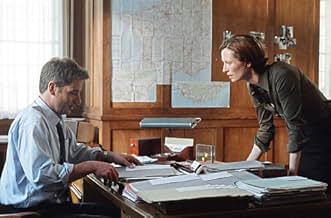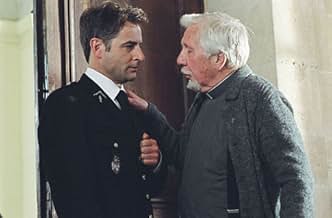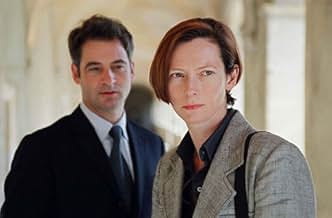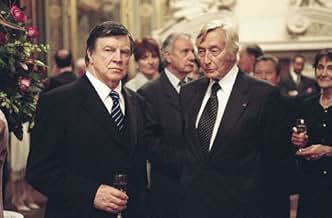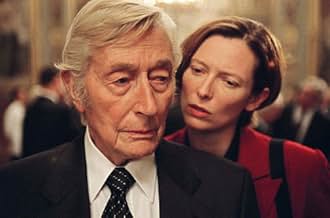VALUTAZIONE IMDb
6,2/10
5731
LA TUA VALUTAZIONE
Aggiungi una trama nella tua linguaTale of a former Nazi executioner who becomes a target of hitmen and police investigators.Tale of a former Nazi executioner who becomes a target of hitmen and police investigators.Tale of a former Nazi executioner who becomes a target of hitmen and police investigators.
- Premi
- 4 vittorie totali
David de Keyser
- Dom André
- (as David De Keyser)
Recensioni in evidenza
I rated this film a 7/10 - with some mixed feelings, because in many ways it was a downbeat film without any kind of neat "message" that would make me feel "a better person" for having seen it. But on second thought I realized that the finished film rather neatly reflects the moral complexity of Brian Moore's novel which it is based upon - and which Ronald Harwood's screenplay follows remarkably closely.
Brian Moore is one of my favorite late 20th century authors, whose work has provided the basis for several other memorable films, most notably "Black Robe." He writes in a Graham Greene-esque mode, his characters often anguished or guilty Catholics or ex-Catholics who struggle to live morally in a degraded and corrupt world. Moore himself appears to have known much about divided loyalties and twentieth century alienation. Although identified as a Canadian author, Moore was born in Ulster - and actually lived most of his later life in California and the South of France. He was clearly fascinated by questions of faith, of good and evil - and he boldly tackled these themes in "The Statement."
In France in the late 1980s and early 1990s there were several prominent cases of Vichy-era collaborators who were belatedly brought to justice by the French court system. Moore was clearly fascinated by the way in which leading members of the French governmental and bureaucratic system continued to hide unpleasant truths about their own pasts - and by the role of the Catholic Church in France in providing refuge and assistance to some individuals who had been involved in the persecution and round-up of Jews.
Michael Caine deserves a great deal of credit for taking on the role of a reprehensible character who nonetheless retains his full humanity. There's never any question in the film about his guilt - he clearly took part in the brutal murder of Jews during wartime. (He's also quite mean to dogs.) And yet he is not without a sympathetic side. It's clear that he's manipulative, but it's also easy to see why many intelligent and devout people of faith would be willing to assist him in his attempt to live "underground" hiding from justice. Caine isn't a caricatured film villain - not like Ralph Fiennes in "Schindler's List" or John Malkovich in "Ripley's Game." But in a real sense, it's all the more disturbing that he seems like "just another innocuous old man."
It was disappointing to me to see that fine performers Jeremy Northam and Tilda Swinton with so little to do in the film - other than looking bewildered as Caine's character continues to elude their grasp. On the other hand, it is quite enjoyable to watch their flirtatious glances with one another. There were many nice touches in the film showing the pleasures of French life - gourmet business lunches, for example, and the beautiful scenery of Provence. Even the supposedly seedy cafes look like they belong in a tourist brochure.
Brian Moore is one of my favorite late 20th century authors, whose work has provided the basis for several other memorable films, most notably "Black Robe." He writes in a Graham Greene-esque mode, his characters often anguished or guilty Catholics or ex-Catholics who struggle to live morally in a degraded and corrupt world. Moore himself appears to have known much about divided loyalties and twentieth century alienation. Although identified as a Canadian author, Moore was born in Ulster - and actually lived most of his later life in California and the South of France. He was clearly fascinated by questions of faith, of good and evil - and he boldly tackled these themes in "The Statement."
In France in the late 1980s and early 1990s there were several prominent cases of Vichy-era collaborators who were belatedly brought to justice by the French court system. Moore was clearly fascinated by the way in which leading members of the French governmental and bureaucratic system continued to hide unpleasant truths about their own pasts - and by the role of the Catholic Church in France in providing refuge and assistance to some individuals who had been involved in the persecution and round-up of Jews.
Michael Caine deserves a great deal of credit for taking on the role of a reprehensible character who nonetheless retains his full humanity. There's never any question in the film about his guilt - he clearly took part in the brutal murder of Jews during wartime. (He's also quite mean to dogs.) And yet he is not without a sympathetic side. It's clear that he's manipulative, but it's also easy to see why many intelligent and devout people of faith would be willing to assist him in his attempt to live "underground" hiding from justice. Caine isn't a caricatured film villain - not like Ralph Fiennes in "Schindler's List" or John Malkovich in "Ripley's Game." But in a real sense, it's all the more disturbing that he seems like "just another innocuous old man."
It was disappointing to me to see that fine performers Jeremy Northam and Tilda Swinton with so little to do in the film - other than looking bewildered as Caine's character continues to elude their grasp. On the other hand, it is quite enjoyable to watch their flirtatious glances with one another. There were many nice touches in the film showing the pleasures of French life - gourmet business lunches, for example, and the beautiful scenery of Provence. Even the supposedly seedy cafes look like they belong in a tourist brochure.
Pierre (Michael Caine) is a Nazi collaborator who has been in hiding for years. He was going to be executed for his deeds but had help escaping decades ago. Now, a judge and colonel are looking for him....as well as some Nazi hunters. But there are two things standing in their way...Pierre is a pretty deadly man and keeps killing Nazi hunters AND Pierre is still getting help from both members of the Catholic church AND government officials. Can they capture the man? And, can the judge and colonel get him to tell them WHO has been helping him?
Although Michael Caine is the star and he's good in the film, he's actually NOT featured all that prominently in the movie. Instead, it shows the various folks coming after him and explaining why...why folks would help a monster like him. Overall, it's a very interesting movie....with a tory that is quite satsifying. One complaint, however, is the lack of French actors in the film...and everyone is supposed to be French. Another is that the film is supposed to be set in the present day (2003) but I think it would have worked better having been set in the 1960s-80s. It's just hard to imagine a man as old a Pierre being such a tough character who's able to kill various Nazi hunters...it just didn't seem realistic as the crimes he committed occurred in 1944...and that would make his character about 80 (more or less) and I cannot imagine any 80 year-old being that dangerous when cornered.
Although Michael Caine is the star and he's good in the film, he's actually NOT featured all that prominently in the movie. Instead, it shows the various folks coming after him and explaining why...why folks would help a monster like him. Overall, it's a very interesting movie....with a tory that is quite satsifying. One complaint, however, is the lack of French actors in the film...and everyone is supposed to be French. Another is that the film is supposed to be set in the present day (2003) but I think it would have worked better having been set in the 1960s-80s. It's just hard to imagine a man as old a Pierre being such a tough character who's able to kill various Nazi hunters...it just didn't seem realistic as the crimes he committed occurred in 1944...and that would make his character about 80 (more or less) and I cannot imagine any 80 year-old being that dangerous when cornered.
"The Statement" deserves far better ratings than critics have given it. In the first place, it's NOT about an ex-Nazi in flight. It's about a French collaborator, the Vichy Government, France's failure to confront the role its officials -- some still in power -- played in the Holocaust, and the efforts of right wingers in the Catholic Church to shelter the collaborator. Michael Caine is superb in the leading role, and Tilda Swinton and Jeremy Northam are excellent as the judge and army colonel who are trying to bring him to justice while those who formerly hid him seek to execute him, blaming a non-existent group of Jewish vigilantes. The supporting cast, which includes the wonderful Charlotte Rampling in a minor role as the collaborator's undivorced wife, is also quite good. I don't see how anyone can complain that this movie "drags." While there are legitimate criticisms that could be made about unexplained motives, the action moves at the appropriate pace given the complexity of the story it is telling.
After France fell to Germany in 1940 , the Vichy regime was set up under Marshal Petain . In 1943 , the Vichy government created a military force called Milice to carry out the Nazi occupiers . When the war was over many of those involved were prosecuted for war crimes . Some get away . A few rose to power . Pierre Brossard ( Michael Caine ) committed crimes against humanity and collaborated with Nazis in WWII . Today Pierre follows hidden by priests of Catholic Church that sheltered him during fifty years and is being protected by a strange sect called The Chevaliers of St. Marie . But a judge ( Tilda Swinton ) and a colonel ( Jeremy Northam ) are investigating his past . Meanwhile , a mysterious murderous ( Matt Craven) is pursuing Pierre to kill him .
This TV movie produced by Canadian television in association with BBC packs suspense , mystery , thrills , action and is quite entertaining . Jewison cast some largely known actors as Michael Caine , his wife well played by Charlote Rampling , the starring duo as Tilda Swinton and Jeremy Northam , and a remarkable support cast as Ciaran Hinds as Inspector Pochon , Alan Bates as Bertier , Frank Finlay as the Comissaire and several others . Atmospheric musical score by Norman Corbeil and appropriate cinematography by Kevin Jewison , director's son . The motion picture is professionally produced and directed by Norman Jewison . He is a prestigious and veteran filmmaker, his greatest film is of course Jesus Christ Superstar . He considers The Hurricane (1999) the last in a trilogy of racial bigotry movies he's realized, the first two being In the Heat of the Night (1967) and A Soldier's Story (1984).
The film terminates with an epilogue based on real events , that says the following : ¨At 5:00 am , on June 29, 1944, in Rilleux -La-Pape, France, seven Jews were executed ¨. The movie is dedicated to those seven men and the 77.000 other French Jews who perished under German occupation and the Vichy regime .
This TV movie produced by Canadian television in association with BBC packs suspense , mystery , thrills , action and is quite entertaining . Jewison cast some largely known actors as Michael Caine , his wife well played by Charlote Rampling , the starring duo as Tilda Swinton and Jeremy Northam , and a remarkable support cast as Ciaran Hinds as Inspector Pochon , Alan Bates as Bertier , Frank Finlay as the Comissaire and several others . Atmospheric musical score by Norman Corbeil and appropriate cinematography by Kevin Jewison , director's son . The motion picture is professionally produced and directed by Norman Jewison . He is a prestigious and veteran filmmaker, his greatest film is of course Jesus Christ Superstar . He considers The Hurricane (1999) the last in a trilogy of racial bigotry movies he's realized, the first two being In the Heat of the Night (1967) and A Soldier's Story (1984).
The film terminates with an epilogue based on real events , that says the following : ¨At 5:00 am , on June 29, 1944, in Rilleux -La-Pape, France, seven Jews were executed ¨. The movie is dedicated to those seven men and the 77.000 other French Jews who perished under German occupation and the Vichy regime .
Your comments will be displayed as follows: A good adaptation of Brian Moore's thriller novel, director Norman Jewison's "The Statement" has its ups and downs.
Michael Caine, who has played many English roles as well as being an American abortion providing doctor, now takes on elderly Frenchman Pierre Brossard, once a shining star of the toady Vichy police force without which the Nazis could never have murdered some 77,000 French Jews. A small percentage of the Holocaust toll but not an unimportant one. Among other acts he participated in the roundup and murder of seven Jews. Such an incident was the basis for the novel.
A man who may belong to a Jewish revanchist organization is killed by Brossard before he can shoot the wheezing, cardiac condition-afflicted former right-hand helpmate for the SS. He's been sheltered for forty years by members of the Catholic clergy.
Tilda Swinton is Judge Levy assigned along with Jeremy Northam, a French army colonel, to find and bring Brossard to trial based on a new law reviving prosecutions against those who committed crimes against humanity. Actually, every important actor in this film except for Charlotte Rampling, who has a small role as Brossard's wife, is English. I'm surprised the French actors' union didn't raise a stink.
This is a chase film with Judge Levy and her colonel either warm or hot on the trail of Brossard who goes from monastery to monastery receiving food, money and help. (In France a judge has vast investigative authority and can and does direct inquiries so the director could credibly have Swinton going from city to city. Imagine Judge Judy flitting about in a chopper ferreting out facts.) At times I thought I was watching a travelogue about the abbeys of Gaul.
There are, of course, hints of a dark conspiracy reaching beyond the Church that I won't reveal.
Caine's peripatetic suspect is deeply religious in the formulaic sense that absolution and ritual salve his conscience but in no way mediate his actions. Caine plays a dirtbag to perfection.
Possibly to avoid charges that the film is unfairly anti-Catholic we're told that
1) the Church is vast, has many subordinate bodies, and those at the top just can't know all that is happening (this defense comes from a gentle librarian-Jesuit priest who also happens to be black, the predominant racial group in the French church).
2) responsibility for aiding genocide by clerics was individual so don't trot out any revisionist Hochhuth/Cornwell/Goldenhagen theories arraigning the Church's leadership.
3) we can't forget that the Resistance was largely communist so maybe there's a rational justification for Vichy's supine collaboration and the very real clerical support for the Nazis if not for every French assisted atrocity.
I despise the mindless Francophobic reaction to France's lack of support for U.S. policy on Iraq. But for too long Vichy and its spineless leaders, Petain and Laval, never mentioned in the film, have gotten a bit of a free ride. So I was happy to see Brossard made frightened as his pursuers close in.
Enjoyable, some nice scenery. Not much more except that Michael Caine is always terrific. And so is Tilda Swinton who brings focused intensity to Judge Levy's unyielding crusade for justice, for that it is.
6/10.
Michael Caine, who has played many English roles as well as being an American abortion providing doctor, now takes on elderly Frenchman Pierre Brossard, once a shining star of the toady Vichy police force without which the Nazis could never have murdered some 77,000 French Jews. A small percentage of the Holocaust toll but not an unimportant one. Among other acts he participated in the roundup and murder of seven Jews. Such an incident was the basis for the novel.
A man who may belong to a Jewish revanchist organization is killed by Brossard before he can shoot the wheezing, cardiac condition-afflicted former right-hand helpmate for the SS. He's been sheltered for forty years by members of the Catholic clergy.
Tilda Swinton is Judge Levy assigned along with Jeremy Northam, a French army colonel, to find and bring Brossard to trial based on a new law reviving prosecutions against those who committed crimes against humanity. Actually, every important actor in this film except for Charlotte Rampling, who has a small role as Brossard's wife, is English. I'm surprised the French actors' union didn't raise a stink.
This is a chase film with Judge Levy and her colonel either warm or hot on the trail of Brossard who goes from monastery to monastery receiving food, money and help. (In France a judge has vast investigative authority and can and does direct inquiries so the director could credibly have Swinton going from city to city. Imagine Judge Judy flitting about in a chopper ferreting out facts.) At times I thought I was watching a travelogue about the abbeys of Gaul.
There are, of course, hints of a dark conspiracy reaching beyond the Church that I won't reveal.
Caine's peripatetic suspect is deeply religious in the formulaic sense that absolution and ritual salve his conscience but in no way mediate his actions. Caine plays a dirtbag to perfection.
Possibly to avoid charges that the film is unfairly anti-Catholic we're told that
1) the Church is vast, has many subordinate bodies, and those at the top just can't know all that is happening (this defense comes from a gentle librarian-Jesuit priest who also happens to be black, the predominant racial group in the French church).
2) responsibility for aiding genocide by clerics was individual so don't trot out any revisionist Hochhuth/Cornwell/Goldenhagen theories arraigning the Church's leadership.
3) we can't forget that the Resistance was largely communist so maybe there's a rational justification for Vichy's supine collaboration and the very real clerical support for the Nazis if not for every French assisted atrocity.
I despise the mindless Francophobic reaction to France's lack of support for U.S. policy on Iraq. But for too long Vichy and its spineless leaders, Petain and Laval, never mentioned in the film, have gotten a bit of a free ride. So I was happy to see Brossard made frightened as his pursuers close in.
Enjoyable, some nice scenery. Not much more except that Michael Caine is always terrific. And so is Tilda Swinton who brings focused intensity to Judge Levy's unyielding crusade for justice, for that it is.
6/10.
Lo sapevi?
- QuizAs of April 2019, this is producer and director Norman Jewison's last movie.
- BlooperWhen Brossard searches the killer's wallet, we can see 500 francs banknotes with the head of Pierre and Marie Curie. This kind of banknote was released in 1994 and the action takes place in April 1992.
- Citazioni
Pierre Brossard: Pray that we meet again... in this world.
- ConnessioniFeatures Only You - Amore a prima vista (1994)
- Colonne sonoreLe Chemin des Forains
Music by Henri Sauguet
Lyrics by Jean Dréjac
Performed by Baguette Quartette
Published by G. Schirmer Inc., administered by Music Sales Corporation
Courtesy of Baguette Quartette
I più visti
Accedi per valutare e creare un elenco di titoli salvati per ottenere consigli personalizzati
- How long is The Statement?Powered by Alexa
Dettagli
- Data di uscita
- Paesi di origine
- Sito ufficiale
- Lingue
- Celebre anche come
- The Statement
- Luoghi delle riprese
- Aziende produttrici
- Vedi altri crediti dell’azienda su IMDbPro
Botteghino
- Budget
- 27.000.000 USD (previsto)
- Lordo Stati Uniti e Canada
- 765.637 USD
- Fine settimana di apertura Stati Uniti e Canada
- 37.220 USD
- 14 dic 2003
- Lordo in tutto il mondo
- 1.079.822 USD
- Tempo di esecuzione1 ora 54 minuti
- Colore
- Mix di suoni
- Proporzioni
- 1.85 : 1
Contribuisci a questa pagina
Suggerisci una modifica o aggiungi i contenuti mancanti



